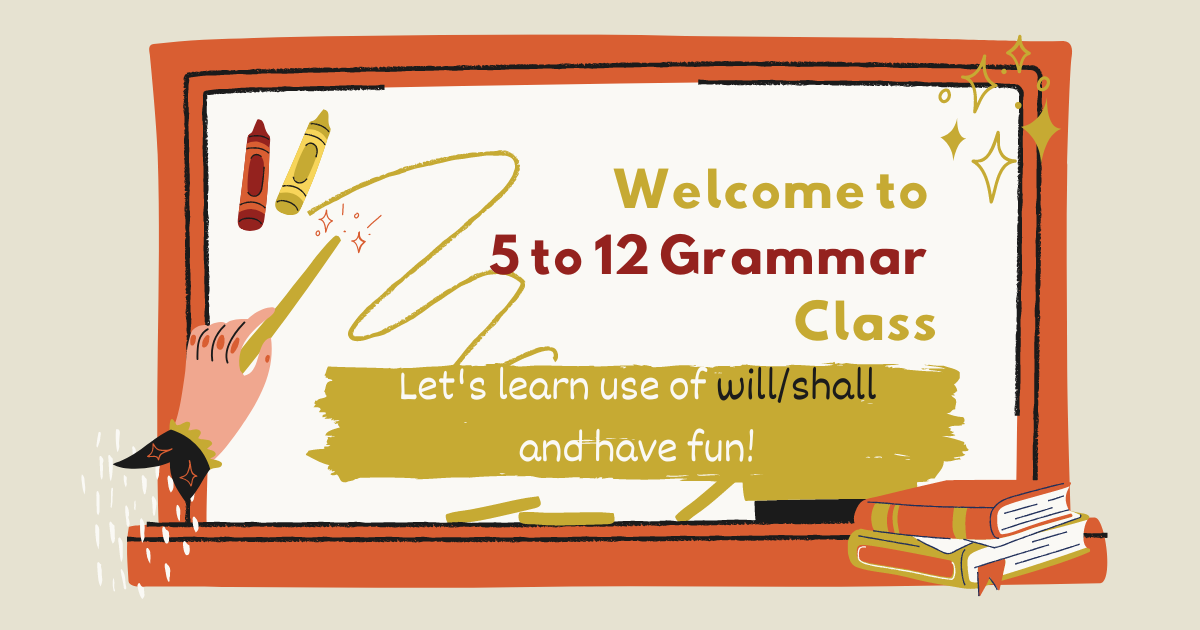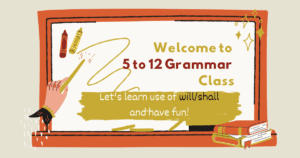In this article we’re going to know How to use will / shall as main verbs in daily English.
या सदरामध्ये आपण रोजच्या बोलण्यात will / shall चा वापर कसा करावा या विषयी माहिती जाणून घेणार आहोत.
will / shall ही वर्तमानकाळात वापरली जाणारी रूपे आहेत.
will/ shall are used in Future Tense as main verbs as well as Helping Verbs.
1. Shall चा वापर = साध्या वर्तमानकाळातील वाक्यात करता एकवचनी प्रथम पुरुषी ( I ) किंवा अनेकवचनी प्रथम पुरुषी (we) असेल तर shall चा वापर करावा.
1. How to use shall in Affirmative Statements.
होकारार्थी विधाने
subject + will + be + noun / object.
I shall be a teacher.
I shall be a doctor.
I shall be an honest officer.
We shall be partners.
We shall be advisers.
We shall be directors.
”””””””””””””””””””””””””’
2. How to use shall in Negative statements
नकारार्थी विधाने
Subject + shall + not + be + noun / main verb/ object
( shall + not = shan’t)
I shan’t be a teacher.
I shan’t be a doctor.
I shan’t be an honest officer.
We shan’t be partners.
We shan’t be advisers.
We shan’t be directors.
””””””””””””””””””””””””””””’
3. How to use shall in Verbal questions
shall / shan’t + subject + be + noun./ main verb/ object
Shall I be a teacher?
Shan’t I be an honest
Shall I be a doctor?
Shan’t we be partners?
Shall I be an honest officer?
Shall we be with sister?
Shall we be advisers?
Shall we be directors?
””””””””””””””””””””””””””””
टिप : I व we या कर्त्यांसाठी shall हे रूप वापरण्याचा नियम असलातरी सध्या will हेच रूप सर्व कर्त्यासोबत वापरले जाते.
eg. 1. I will be a teacher.
2. We will be teachers.
”””””””””””””””””””””””””””’
2. Use of Will
Will चा वापर
कर्ता जर एकवचनी द्वितीयपुरुषी , तृतीयपुरुषी किंवा अनेकवचनी द्वितीय किंवा तृतीय पुरुषी असेल तर will चा वापर करतात.
1. How to use will in Affirmative Statements.
होकारार्थी विधाने.
Subject + will + be + noun / main verb/ object
You will be a teacher.
You will be reporters.
They will be teachers.
Prashant and Sonali will be in Kolhapur.
Lion and tiger will be come.
He will be with us tomorrow.
She will be go.
””””””””””””””””””””””””””””””
2. How to use will in Negative statements.
नकारार्थी विधाने.
Subject + will + not + noun/ main verb/ object.
will + not = won’t
You won’t be a teacher.
You won’t be reporters.
They won’t be teachers.
Prashant and Sonali won’t be in Kolhapur.
Lion and tiger won’t be come.
He won’t be with us tomorrow.
She won’t be go.
””””””””””””””””””””””””””””’
3. How to use will in Verbal questions.
Will + subject + be + noun/ main verb/ object ?
Will you be a teacher?
Will you be reporters?
Will they be teachers?
Will Prashant and Sonali be in Kolhapur?
Will lion and tiger be come?
Won’t she be with us tomorrow?
Won’t he be go?
”””””””””””””””””””””””””””””
टीप.. you हे द्वितीय पुरुषी कर्त्याचे रूप एकवचन व अनेकवचन दोन्ही मध्ये वापरले जाते.
Let’s Practice :
Use shall, will, shan’t, won’t properly in the following sentences.
1. I ….. be a captain.
2. ….. I be a captain?
3. He ….. be a lawyer.
4. ….. he be a lawyer?
5. They …..be painters.
6. ….. they be painters?
7. You ….. be collectors.
8. …… you be collectors?
9. You ….. be a president.
10. …… you be a president?
,,,,,,,,,,,,,,,,,,,,,,,,,,,,,,,,,,,,,,,,,,,,,,,,,,,,,,,,,,,,,,
अशा पद्धतीने वाचण्याचा, लिहिण्याचा सराव केल्यास आपणही सहज इंग्रजी बोलू शकतो.




